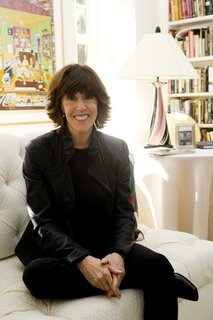
13 Nov 2010 00:44:34
She wonders what they are. It's one of those concepts, such as Twitter and heavy metal, that exist only to remind her she has lived too long. Unsure of her own definition, she takes a little nip from that electronic flask in her handbag, that digital demon rum: her iPhone.
"Algorithm," she reads, "a set of rules for solving a problem in a finite number of steps, as for finding the greatest common divisor."
Exactly. "Thank God for my portable device."
She is seated at an Upper East Side diner, around 10:30 a.m., warmed up in a dark blouse and matching slacks, enjoying scrambled eggs and crisp bacon, undisturbed by the occasional glances from two middle-age men, in business attire, in the next booth.
Ephron is 69, known for such books as "Heartburn" and "Crazy Salad," and for the movies "Sleepless in Seattle" and "Julie & Julia." She is a parent and grandparent settled in a long-term marriage with her third husband, author Nicholas Pileggi. She has been writing about silly and serious matters for 50 years, from hooded seals to nuclear power plants to the silly and serious matters of men and women.
As middle age became a certain age, the laughs have turned darker and the joke has increasingly been on herself. In 2006, she had her biggest commercial success as an author with the million-selling essay collection "I Feel Bad About My Neck." The subjects included aging, illness and death, a corrective she says, to all those books that tell you how wonderful it is to grow old.
She is back with "I Remember Nothing," essays about family, journalism and everyday and eternal bothers. There are lists of what she'll miss (bacon, Paris) and what she won't (funerals, mammograms). Much of the book is a farewell to her own memory. She's not writing about Alzheimer's, but the way people and places and events fade as if erased from tape.
This is a new kind of name-dropping. She can brag about having met the Beatles, but not about what they said. She doesn't know. Same for Cary Grant, Dorothy Parker and Eleanor Roosevelt. She marched on Washington in 1967 to protest the Vietnam War and remembers only the sex she had in her hotel room.
As a reporter for the New York Post, she interviewed the much-censored Lenny Bruce several times.
"Lenny Bruce kept being thrown out of New York and every time he was, I was sent to meet him at the airport," Ephron says. "What did he say? You don't know and neither do I."
Her amnesia appears contagious. One old friend, author-humorist Calvin Trillin, spoke of Ephron as a great wit and a colorful "Auntie Mame" figure to his daughters. But he was stumped when asked for a favorite memory.
"My mind goes blank," he says. "I can't think of the time that Nora did such and such. I suppose one will come to me as I fall asleep tonight."
"Algorithm," she reads, "a set of rules for solving a problem in a finite number of steps, as for finding the greatest common divisor."
Exactly. "Thank God for my portable device."
She is seated at an Upper East Side diner, around 10:30 a.m., warmed up in a dark blouse and matching slacks, enjoying scrambled eggs and crisp bacon, undisturbed by the occasional glances from two middle-age men, in business attire, in the next booth.
Ephron is 69, known for such books as "Heartburn" and "Crazy Salad," and for the movies "Sleepless in Seattle" and "Julie & Julia." She is a parent and grandparent settled in a long-term marriage with her third husband, author Nicholas Pileggi. She has been writing about silly and serious matters for 50 years, from hooded seals to nuclear power plants to the silly and serious matters of men and women.
As middle age became a certain age, the laughs have turned darker and the joke has increasingly been on herself. In 2006, she had her biggest commercial success as an author with the million-selling essay collection "I Feel Bad About My Neck." The subjects included aging, illness and death, a corrective she says, to all those books that tell you how wonderful it is to grow old.
She is back with "I Remember Nothing," essays about family, journalism and everyday and eternal bothers. There are lists of what she'll miss (bacon, Paris) and what she won't (funerals, mammograms). Much of the book is a farewell to her own memory. She's not writing about Alzheimer's, but the way people and places and events fade as if erased from tape.
This is a new kind of name-dropping. She can brag about having met the Beatles, but not about what they said. She doesn't know. Same for Cary Grant, Dorothy Parker and Eleanor Roosevelt. She marched on Washington in 1967 to protest the Vietnam War and remembers only the sex she had in her hotel room.
As a reporter for the New York Post, she interviewed the much-censored Lenny Bruce several times.
"Lenny Bruce kept being thrown out of New York and every time he was, I was sent to meet him at the airport," Ephron says. "What did he say? You don't know and neither do I."
Her amnesia appears contagious. One old friend, author-humorist Calvin Trillin, spoke of Ephron as a great wit and a colorful "Auntie Mame" figure to his daughters. But he was stumped when asked for a favorite memory.
"My mind goes blank," he says. "I can't think of the time that Nora did such and such. I suppose one will come to me as I fall asleep tonight."

